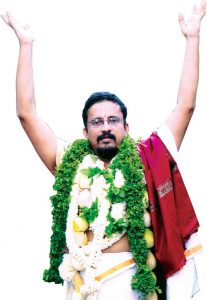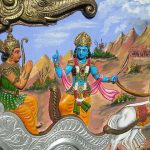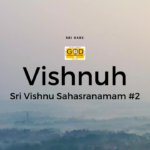
Bhagavan Sri Krishna gives several upadesas to Arjuna which is verily compiled as Bhagavad Gita. In one sloka Bhagavan describes the four different types of his bhaktas and goes on to say that though they are different, they all are blessed in their own ways.
chatur-vidhA bhajante mAm janAh sukritinOrjuna
Artho jignAsur arthArthI jnAnI cha bharatarishabha
He says, the first kind of devotee is an Arthi. They are the ones who have miseries and sufferings in life and they come and pray to Me to get relief from these miseries and sufferings. The next type, arthArthi, comes to me to have their worldly desires fulfilled. The third type jijnAsu has the clarity that this life will have ups and downs, sorrows and happiness and also never-ending needs. So this type of bhakta comes and prays to me for jnana. The fourth type of bhakta – a jnani – does bhakti with no expectation, they just do bhakti for the anubhava (joyful experience). This is highlighted by using “cha” after ‘jnani’ in the above sloka.
In the next sloka
udhArAh sarva evaite jnAnī tvAtmaiva me matam
Asthitah sa hi yuktAtmA mAm evAnuttamAm gatim
Bhagavan tells Arjuna – Even though all of these types of bhaktas are blessed in their own ways, jnanis are very close to My heart, because they do bhakti just for the sake of anubhava. They enjoy chanting My Name, listening to My glories and listening to My leelas.
Bhagavan says these bhaktas (all four types) are blessed because of two things. One is their sadhana, i.e. the way in which they do bhajan – chatur vidhA bhajante. They do nothing but chant my Divine Names. Bhagavan Nama Bodhendra Swami in his Nama Siddhantham asks a question and also gives the answer to his own question. The question goes – Does doing Nama Sankirtan give you punya (merits)? He answers this by saying that only if you have accrued punya (merits) in your previous births will you even be able to chant Nama even once in your lifetime. The second is ‘mAm’ (chatur vidhA bhajante mAm). Krishna says these bhaktas come to Me, rather than going somewhere else, because they believe in taking refuge in Me. The believe that I will be able to answer their prayers and resolve and take care of their needs. So the two paths – first of Nama Sankirtan and the second one being taking refuge unto Me.
So a question arises now whether we are going to Krishna on our own or Krishna choses who comes unto Him. It is actually Bhagavan who hand picks which devotees come to Him. Upanishads says yamaivaisha vivrunute tena labhya, it is not by our effort that we are able to go and stand in front of Bhagavan; it is only Bhagavan who pulls us to come to His sannidhi, and makes us chant and/or pray. He fulfills all their prayers and bestows them with their needs. This is purely because of His compassion, that is His Krupa. What is great is that they never go against the path of dharma.
Our Guru Maharaj gives a beautiful example for us to understand the compassion of Bhagavan. Let’s take an example of a school in which the students pass with very high scores. But the fine print here is that the school has a very strict eligibility criteria for student enrollment. Only already high-ranked students will even be able to gain admission into the school. So now looking into this aspect, is it any surprise that the school is able to produce good results? On the contrary if there is a school which admits students with average grades and coaches them to produce good results, then this school is doing a better job.
Likewise, Nama and Bhagavan’s compassion not only takes care of the four type of bhaktas, it purifies even a person who is in the adharmic path and has accrued a lot of sins. Sri Vijayagopala Swami prays to Bhagavan in a kirtan, which we usually sing as a part of Divya Namam. He prays, what is great about you Krishna in purifying or giving moksha to a person who already follows the path of dharma, who always does bhakti to you? He says aparAdhAlayam tathApi sharaNAgatam. He says, “I am a temple of negativities, a temple of wrongs, a temple of bad qualities, despite that You shower Your grace towards me and purify me. If you purify even me and wash off all my sins, that gives a big keerthi to you that Krishna purified even a neecha like me. That makes you great Krishna. mAm cha pAlaya mahAnubhAvA Krishna!
Bhagavan says in Bhagavad Gita
api chet su-durAchAro bhajate mAm ananya-bhAk
sAdhur eva sa mantavyah samyag vyavasito hi sah
kshipram bhavati dharmAtmA shashvat shAntim nigacchati
kaunteya pratijAnIhi na me bhaktah praNashyati
The su in this shloka is a superlative to emphasize that even if a person chants My name once, you should think of him as a sadhu. It does not matter if the world showers all praises on someone whom Bhagavan does not accept. On the contrary if Bhagavan accepts someone even though the world despises him, that person is the chosen one. If you chant Bhagavan Nama even knowingly or unknowingly you are purified. Even if you utter the Bhagavan Nama just to make fun of it, you still reap the benefits. If Nama comes in a person’s mouth knowingly or unknowingly, he should be considered a sadhu. Bhagavan does not specify in this shloka that only a person like Prahlada is considered his bhakta; it is for a person like Ajamila also who has done a lot of sins. This is to emphasize that Bhagavan does not forgo such a person. He is so compassionate that He looks for an opportunity to take even such a person under His fold if they utter His Divine Name even once in their lifetime.
Bhagavad Gita is like a Sutra and Bhagavatam is like a vyAkyAnam for it. For Bhakthi Marga two scriptures are important. Bhagavad Gita is considered as the mother of bhakti and Srimad Bhagavatam is the father of bhakti, and the child is Bhakti herself. The greatness of Bhagavad Gita is that it came straight from the mouth of Bhagavan in the battlefield of Kurukshethra. Srimad Bhagavatam is given by Bhagavan out of compassion to purify us in this age of Kali Yuga. If a person follows the path of Bhakti Marga it is Bhagavan who takes charge and guides him, unlike someone following other paths of sadhana where the onus is on the person himself. Srimad Bhagavatam beautifully extolls this in the form of Ajamila Charitra wherein Ajamila gets moksha just by calling out Bhagavan Nama.
Sri Shivakumar Murali (Sri Gadhadharan), Chennai, India

************************************
Click here to go back to the July 2021 newsletter page:
http://godivinity.org/newsletters/nama-dwaar-newsletter-july-2021/
************************************






